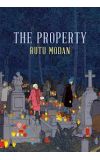
16 Jul 2013 02:36:40
On one level, then, Modan's book is an old-fashioned page turner: just what is it that Regina is hiding, and how has she managed to keep it out of sight for so long? (Unlike most comics, The Property is superbly plotted.) But it's so much more than this. For Modan, nothing is sacred, not even the Holocaust, and her satirical impulses are always at play, whether she is sending up the queasy tourist industry that now relies on its memory ("Personally, I prefer Majdanek to Auschwitz," says a schoolteacher, going over his class's itinerary on the flight to Warsaw), or the efforts of 21st-century Poles to make reparation for what happened to their country's Jews ("I really miss the ghetto," says a woman from the Society for Jewish Memorialisation, a group that organises "re-enactments" in which young people wearing yellow stars are rounded up by pretend Nazi soldiers). All this education and public anguish: does it do any good, or is it just for show? About this, Modan seems to be ambivalent. And people will reveal themselves. "With your determination – I promise – you'll die a landlord," Mica's Polish lawyer tells her, cheerfully, when she is thwarted by an awkward legal truth. The expression on her face – should she laugh or slap him? – is priceless.
I know it's only July, but I feel certain this will end up being my graphic novel of the year. Modan has it all. Her drawings are fantastically expressive, with the result that her characters are as many-layered as those you'll find among the pages of a traditional novel. She is witty and wise, cool-headed in a world of feverish opinions. Most impressive of all, though, is her technique when it comes to matters of pace and deep emotion. Early on, for instance, Regina prepares herself for an important encounter. Modan does not tell us who she is about to meet, but we register its looming weight thanks to a series of wordless panels. We watch the old woman slowly apply her lipstick, pat her collar, put on her earrings. She looks proud, even tough. But then there comes a final frame in which her mirror face briefly dissolves, and we suddenly grasp the reality. Behind all that pressed powder, she is still a girl, really: vulnerable and trembling inside.

